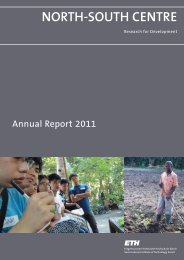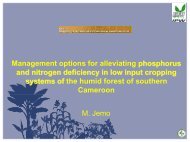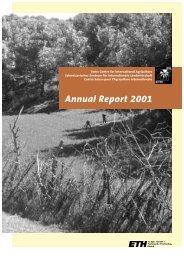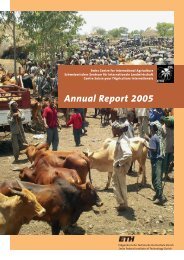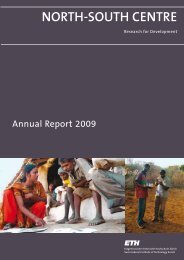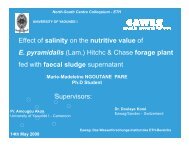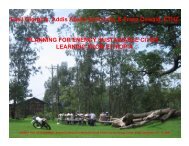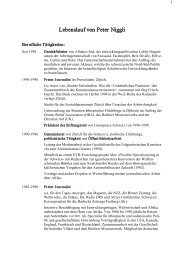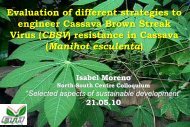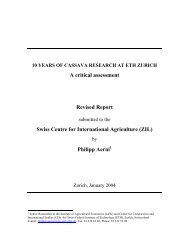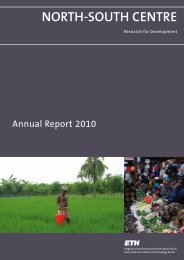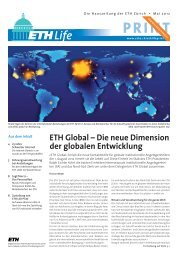An introduction to ZILLivestockNetLivestockNet is a Swiss network of university, private sector,NGO and government stakeholders working in livestockand development. Its overall goal is to improve Swiss actionsand to strengthen the Swiss position in livestock anddevelopment issues.The specific objectives of LivestockNet are• to enhance exchange of information between the members;• to discuss issues of common interest;• to link global and regional initiatives and operationalin-country work;• to catalyse work in thematically focussed groups;• to provide support and a sounding board for decision-makingthrough advice, reference and links to other networks andinstitutions;• to enhance the interest and the position of Swiss actors andprogrammes in livestock and development; and• to play an advocacy role and provide advice on policies.LivestockNet is a formal group of interested professionals workingin livestock and development, legally organised as an association.Members normally convene two times per yearfor a one-day meeting with time for informal interactions. Thenetwork establishes a working programme and the memberscontribute to the work required by this programme. It operateson a “give-and-take” principle, based on the inputs and commitmentsof all its members. The chair rotates between the membersand is currently held by Fritz Schneider (SHL, Zollikofen).Networking with Swiss partnersIn <strong>2006</strong>, the members of LivestockNet voted to transfer theirsecretariat to the ZIL office. This transfer became effective inJanuary 20<strong>07</strong> under the responsibility of the ZIL ProgrammeFacilitator Mathias Egloff, adding a 10 % position to his ZILmandate. This change came at an important time in the internationallivestock policy arena: In September 20<strong>07</strong>, the FirstIntergovernmental Conference on Animal Genetic Resourceswill be hosted by Switzerland in Interlaken. LivestockNet will bepresent with a stand at the public exhibition to promote itsactivities on livestock for development.ZIL continued its commitment to the Swiss Forum forInternational Agricultural Research (SFIAR), and its collaborationwith the various members of this Forum, e.g. Intercooperation,InfoAgrar and the Federal Office for Agriculture(BLW). Notably, the Swiss College of Agriculture (SHL) inZollikofen and the <strong>Centre</strong> for Development and Environment(CDE) of the University of Berne remained key partners, notonly in the ERA-ARD project (p. 22), but also through a numberof bilateral linkages and joint participation in workinggroups such as the ZIL and RFPP Selection Committees, andthe Commission for Partnerships with Developing Countries(KFPE).SDC has remained a most reliable and generous partner anddonor to ZIL, primarily thanks to the great understanding andcommitment of Willi Graf, as the direct counterpart of ZIL, aswell as the support of the SDC management.Networking with international partnersThe commitment of ZIL and its management to its partners inthe international agricultural research community hasremained as strong as before. Each individual ZIL membermaintains his or her own network of research partners, andvisits the partner institutions regularly for project supervisionand the development of new research ideas. Most contacts aremaintained through individual visits of our international partnersto the <strong>ETH</strong> Zurich, most notably in <strong>2006</strong> and 20<strong>07</strong> by theirparticipation in the two Progress Fora. In addition, ZIL receivedthe key speakers at its <strong>Annual</strong> Conferences, and individualvisits of the Director Generals of IFPRI and CIAT, Joachim vonBraun and Joachim Voss, respectively, as well as JohnMcDermott, the Director of Research of ILRI.The CGIAR is still the most important partner for ZIL, primarilyin direct research collaboration, but also on the strategic levelin setting the international agricultural research agenda. TheZIL Executive Manager not only routinely attends the <strong>Annual</strong>General Meetings of the CGIAR – she also serves on the Boardsof Trustees of IITA and WARDA.12
An introduction to ZILThe ZIL Executive Manager has continued her service on theSteering Committee of the European Forum for AgriculturalResearch for Development (EFARD) as its Vice-Chair. EFARD succeededin nominating George Rothschild from the UK as itsnew Chairman, who took up his duties in June 20<strong>07</strong>, as successorof Hans Hurni from the University of Berne. In Spring 20<strong>07</strong>,the EC mandated an external evaluation of EFARD, which isnow working towards implementing the recommendations.The ERA-ARD project is another strong linkage to the EuropeanARD community (p. 22).As Vice-Chair of EFARD, Barbara Becker also represented theEuropean Forum in the Steering Committee of GFAR, theGlobal Forum for Agricultural Research. GFAR is in a transitionphase of its secretariat, and in a similar stage as EFARD withrespect to implementing the recommendations of its recentexternal evaluation.As delegate of the D-AGRL, Barbara Becker continued to representthe <strong>ETH</strong> Zurich at the General Assembly of NATURA, theNetwork of European Agricultural (Tropically and SubtropicallyOriented) Universities and Scientific Complexes related toAgricultural Development, thus ensuring the link to theEuropean universities engaged in teaching tropical agriculture.Internal developmentsZIL’s business year was dominated by the integration processwith NIDECO and the transition of the SDC contract fromphase IV to V. As an association, ZIL pursues a bottom-up philosophywhere all decisions must be approved by its members.The ZIL President was instrumental in leading the integrationprocess on behalf of the two institutions. He had the full supportof the entire ZIL Board, which took on the additional loadof consultations and meetings to guarantee a smooth transition.The final decision of dissolving the association ZIL wastaken by its General Assembly on June 26, 20<strong>07</strong>.The new contract phase required adjustments in its financeadministration, as agreed in several meetings with SDC in earlyThe ZIL Management Team (clockwise from upper left): Sabine Hahn-Fornet,Emma Lindberg, Barbara Becker, Dorota Niedzwiecka, Matthias Egloff,Mark Zoss, Manfred Kaufmann<strong>2006</strong>. Ultimately, these adjustments gave the ZIL managementgreater autonomy and responsibility, which was approved inJune <strong>2006</strong> by the General Assembly. The new external auditorproved to be a very constructive advisor concerning theincreasingly complex finance administration.The ZIL management team remained the same lively group asbefore. Barbara Becker attended a seven-weekend course onresearch management in <strong>2006</strong>. Dorota Niedzwiecka went on atwo-month internship to FAO in Rome in late <strong>2006</strong>. Her substituteduring this period was Nanina Gubler, who had done herpractical training in the ZIL management office in 2005. In20<strong>07</strong>, the team was complemented by Sabine Hahn-Fornet asconsultant for the Impact Study, and by Emma Lindberg asassistant for the preparation of the Inaugural Conference ofthe <strong>North</strong>-<strong>South</strong> <strong>Centre</strong>. The entire team is committed to continueits service to the ZIL community and its partners underthe new institutional umbrella with increased strength andresources.Barbara Becker, August 20<strong>07</strong>13
- Page 1 and 2: Swiss Centre for International Agri
- Page 3 and 4: Table of contentsZIL members. . . .
- Page 5 and 6: EditorialThe present Annual Report
- Page 7 and 8: An introduction to ZILThe ZIL proje
- Page 9 and 10: An introduction to ZILThe Progress
- Page 11 and 12: An introduction to ZILOn September
- Page 13: An introduction to ZILIn 2007, the
- Page 18 and 19: Impact StudyThe development impact
- Page 20 and 21: Impact Study18market opportunities
- Page 22 and 23: Impact Study20ral (N), human (H), f
- Page 24 and 25: ERA-ARDThe European Research Area i
- Page 26 and 27: ZIL research projectsOverviewLivest
- Page 28 and 29: ZIL research projectsIntegratedPest
- Page 30 and 31: ZIL research projectsEcosystemservi
- Page 32 and 33: ZIL research projectsLivestocksyste
- Page 34 and 35: ZIL research projectsLivestocksyste
- Page 36 and 37: ZIL research projectsLivestocksyste
- Page 38 and 39: ZIL research projectsLivestocksyste
- Page 40 and 41: ZIL research projectsLivestocksyste
- Page 42 and 43: ZIL research projectsLivestocksyste
- Page 44 and 45: Research Fellow Partnership Program
- Page 46 and 47: Research Fellow Partnership Program
- Page 48 and 49: Research Fellow Partnership Program
- Page 50 and 51: Research Fellow Partnership Program
- Page 52 and 53: Research Fellow Partnership Program
- Page 54 and 55: Research Fellow Partnership Program
- Page 56 and 57: Research Fellow Partnership Program
- Page 58 and 59: Research Fellow Partnership Program
- Page 60 and 61: Research Fellow Partnership Program
- Page 62 and 63: Research Fellow Partnership Program
- Page 64 and 65:
Seed MoneySeed Money Projects 2003-
- Page 66 and 67:
Other international projects of ZIL
- Page 68 and 69:
Teaching activities related to deve
- Page 70 and 71:
Development-related thesesSupervisi
- Page 72 and 73:
Development-related thesesSuperviso
- Page 74 and 75:
PublicationsPublications72Refereed
- Page 76 and 77:
PublicationsMathayya, S., Thankacha
- Page 78 and 79:
PublicationsVariaZIL funded project
- Page 80 and 81:
PublicationsRFPP projectsAbang, M.,
- Page 82 and 83:
PublicationsStupak, M., Alder, A.,
- Page 84 and 85:
PublicationsStickstoffumsatz und di
- Page 86 and 87:
PublicationsOther international pro
- Page 88 and 89:
Publicationssubandinen Waldweide-Sy
- Page 90 and 91:
ZIL members, collaborators and part
- Page 92 and 93:
ZIL members, collaborators and part
- Page 94 and 95:
AccountsAccounts 2006*Balance, Dece
- Page 96:
Swiss Centre for International Agri




